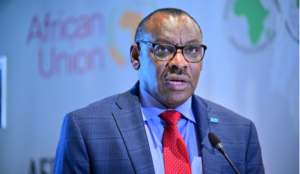Africa’s debt crisis worsens: 21 countries at high risk of debt distress

Africa’s debt crisis continues to deepen, with 21 countries on the continent at high risk of debt distress and public debt has increased by over 180 per cent.
Dr Claver Gatete, the Executive Secretary of the Economic Commission for Africa (ECA) who raised the concerns while speaking at the opening of the Summit of the Future in New York City, USA, said “the foundation of humanity is being tested and Africa is bearing the brunt.”
Dr Gatete indicated that multiple crises have exacerbated the challenges of finance, debt, climate and energy.
“21 African countries are in or at high risk of debt distress and public debt has increased by over 180 percent since 2010 and currently exceeds 60 per cent of GDP. Basic social expenditures are being crowded out and there is limited access to long-term concessional finance,” he said,
He further indicated that unprecedented climate effects are costing up to five per cent of Africa’s GDP annually.
“Yet, we cannot attract sufficient investments because the rules of engagement of global rating agencies do not favour Africa. We also see imbalances in borrowing costs. For example, Africa’s borrowing cost is four times higher than the United States and even more than four times than Germany,” he stated.
Dr Gatete said justice for Africa cannot be served by an outdated global financial architecture system, noting that promises are either not fulfilled or half fulfilled, leaving governments frustrated, young people unemployed and children without a future of hope and prosperity.
He therefore called on African leaders not to remain theoretical.
“If we remain theoretical on the reform of the multilateral system, it will be a disservice to the generations that come after us. Undoubtedly then, multilateral governance structures must change,” he said.
Specifically, he said, there is need for increased representation for developing countries, improved transparency, a reflection of the role of emerging and frontier markets and regional Multilateral Development Banks.
Furthermore, the finalization and implementation of the international tax cooperation framework must be pursued vigorously, he added.
According to Dr Gatete, Africa can be the global power force if the critical gaps for a fair and promising future are addressed.
He also called om African countries to take deliberate steps to invest in the youth because 1 in 3 young people globally will be African by 2050.
“Therefore, investments in modernizing education systems, increasing skills in STEM and integrating TVET in education systems is necessary. And the Global Digital Compact can offer Africa a level playing field, but we must build the necessary infrastructure to take full advantage of this,” he said, adding that “this is our once in a lifetime chance to demonstrate to future generations that we got it right. It is my belief that we can make it count.”
By Emmanuel K Dogbevi
